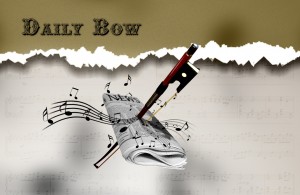 This week’s Monday Daily Bow takes a look at the latest updates on the musical mind. There have been some very interesting innovations in this ever-evolving field.
This week’s Monday Daily Bow takes a look at the latest updates on the musical mind. There have been some very interesting innovations in this ever-evolving field.
Musical Creativity and the Brain
In a new piece published in the journal Cerebrum, Charles Limb, faculty member and Dana Foundation grantee at The Johns Hopkins School of Medicine, and postdoctoral fellow Mónica López-González, describe their research into musical creativity and the brain. Using brain imaging to study the neural underpinnings of spontaneous artistic creativity, they have made some fascinating discoveries:
- Brain areas deactivated during improvisation are also at rest during dreaming and meditation
- Brain areas activated during improvisation include those controlling language and sensorimotor skills.
While there still remains much to study, the researchers are convinced that musical creativity cannot be tied to just one brain area or process.
See more details about this incredible research on musical creativity and the brain.
Healing the Brain and Music
Academic researchers, many of them based in Canada, have been diving into the possibilities of healing the brain through music using brain imaging and other high-tech tools.
Unlike drug therapies or surgical brain implants, musical interventions are safe, enjoyable and noninvasive, notes Jessica Grahn, a neuroscientist at the University of Western Ontario. “There is essentially no downside.”
Dr. Grahn is heading a new lab to study how the brain processes music and whether specific characteristics of music can help patients with movement disorders improve their gait.
Researchers will use functional MRI to see which motor areas of the brain are activated in listening to music. The lab, due to open by fall, will include a mat equipped with sensors in a walkway. Using computer software to analyze data, Dr. Grahn’s team will assess whether listening to pulsations affects things like the symmetry between the stride, “which is really important for balance in Parkinson’s patients,” she says.
Meanwhile, in Toronto, neuroscientist Takako Fujioka is studying musical interventions in stroke patients at Baycrest’s Rotman Research Institute. Dr. Fujioka has just secured funding to conduct a three-year study involving 60 stroke patients with movement problems in one hand – one of the most lingering disabilities among stroke survivors.
Researchers will randomly select patients to receive physiotherapy or participate in activities such as hitting a drum to a beat using a stick, palm or fist. Patients will wear helmets equipped with sensors used for magnetoencephalography (MEG), a technique for mapping brain activity.
Learn more by reading about music’s ability to heal the brain.
Aging in the Brain and Music
We’ve looked at music in rehabilitative and creative contexts. What else is there? How about preventive care.
New research suggests that all of the hours music students whittle away in the practice hall might have an indirect health benefit… the reduction of age-related hearing loss.
Researchers at Northwestern’s Auditory Neuroscience Laboratory, recorded 87 subjects’ neural responses to sound. A neural response is the change in potential of a nervous system in response to sound, said Alexandra Parbery-Clark, doctoral candidate in the Auditory Neuroscience Laboratory and first author of this study.
Researchers compared the neural responses of older and younger musicians. They then compared the responses of older and younger non-musicians.
“We found that neural aging is less in the musician population,” said Parbery-Clark.
Next time you find yourself whining about how many hours of practice you have to do, take comfort in the fact that you will have an ear up against the other seniors at square dancing when you are 65!
Read more on slowing the aging brain with music.
“Hacking the Brain”
Finally, in a real treat, musicians Bobby McFerrin uses the pentatonic scale to reveal something about how our brains are wired in this fun, 3 minute performance from the World Science Festival.














No comments yet.